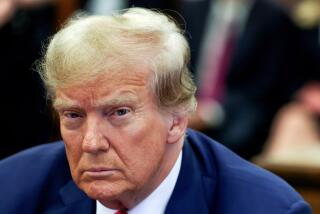At summit, hope that Trump may reconsider his opposition to Paris climate accord
From left: China’s representative on climate change Xie Zhenhua, Canadian Environment Minister Catherine McKenna and European Union Commissioner for Climate Change and Energy, Miguel Arias Canete, speak to the press after a ministerial meeting on Sept. 16, 2017 in Montreal to push forward on implementing the Paris climate accord without the United States, three months after President Donald Trump walked out on the deal.
A European official said Saturday that the Trump administration has softened its opposition to the landmark Paris climate accord and may not completely withdraw after all.
If true, this would mark another reversal of one of President Trump’s key campaign promises, one of the most controversial.
But the White House quickly sought to rebut the report, which was first reported by the Wall Street Journal.
“There has been no change in the United States’ position on the Paris agreement,” said Lindsay Walters, a presidential spokeswoman. “As the president has made abundantly clear, the United States is withdrawing unless we can reenter on terms that are more favorable to our country.”
Later, White House spokeswoman Sarah Huckabee Sanders wrote on Twitter, “Our position on the Paris agreement has not changed. @POTUS has been clear, US withdrawing unless we get pro-America terms.”
At a ministerial summit of 30 countries in Montreal, where the United States participated as an observer, the European Union’s top climate official said the Trump administration had backed away from its declaration in June that it was abandoning the historic 2015 agreement.
The U.S. “stated that they will not renegotiate the Paris accord, but they will try to review the terms on which they could be engaged under this agreement,” Miguel Arias Canete said, according to wire reports.
Arias said he and other officials involved with the Paris agreement would meet on the margins of this week’s United Nations General Assembly in New York to determine what the “real U.S. position” was.
But, he added, “it’s a message which is quite different to the one we heard from President Trump in the past.”
It was not immediately clear how much, if anything, had changed in the U.S. position.
Under the agreement’s terms, Trump’s decision to withdraw cannot fully take effect for almost four years. In the interim, Trump has said he hopes to renegotiate an accord “on terms that are fair to the United States.”
Some experts have suggested that left Trump with a bit of wiggle room, where he could declare he had withdrawn, only to renegotiate terms that he would portray as being more favorable to the U.S.
The meeting in Montreal stood out for the lack of a high-level U.S. presence. Other countries asserted their commitments to fighting global warming.
“The Paris agreement should not be renegotiated,” said Xie Zhenhua, China’s special representative for climate change affairs.
Washington has indicated it will continue to participate in these meetings, albeit at a lower level.
“We continue to engage them,” Canada’s environment minister Catherine McKenna said. “We continue to make the case that like the United States, we want to create jobs, we want to create economic growth.”
When Trump announced his decision to withdraw from the accord, he was adamant that the U.S. would ignore voluntary goals on limiting greenhouse-gas emissions and other elements believed to contribute to global warming.
Trump argued the agreement was bad for U.S. businesses and that it made Washington pay too much for pollution caused by other countries.
Global warming has renewed political currency in the wake of Hurricane Harvey, which caused epic floods in Houston, and Hurricane Irma, which devastated parts of the Caribbean and left millions of people in Florida without electricity. Scientists say warmer waters may have intensified the monster storms’ force.
Two more storms, Jose and Maria, are churning off the East Coast.
Environmental activists said they saw no sign that the storms would change Trump’s claims that climate change is a hoax.
“For anyone who had any hope that two historically devastating storms striking our nation would wake up the Trump administration to the reality of the climate crisis, think again,” the Sierra Club said in a statement Saturday, noting that the White House had quickly denied claims out of Montreal.
Trump was criticized in environmental circles and European capitals when he announced the U.S. withdrawal from the Paris accord, a hard-fought agreement that brought together almost every country in the world to confront climate change.
It was a signature achievement of the Obama administration and rare diplomatic agreement for the United States and China, the world’s two largest economies and the two largest producers of carbon-gas emissions.
Other countries, and many U.S. states, including California, said they would forge ahead with meeting the goals of the climate agreement despite Trump’s plan to withdraw.
In June, Trump argued that the deal would “undermine our economy, hamstring our workers, weaken our sovereignty ... and put us at a permanent disadvantage to the other countries of the world,” he said. “It is time to exit the Paris accord.”
For more on international affairs, follow @TracyKWilkinson on Twitter
Staff writer Noah Bierman contributed to this report.
More to Read
Start your day right
Sign up for Essential California for news, features and recommendations from the L.A. Times and beyond in your inbox six days a week.
You may occasionally receive promotional content from the Los Angeles Times.







